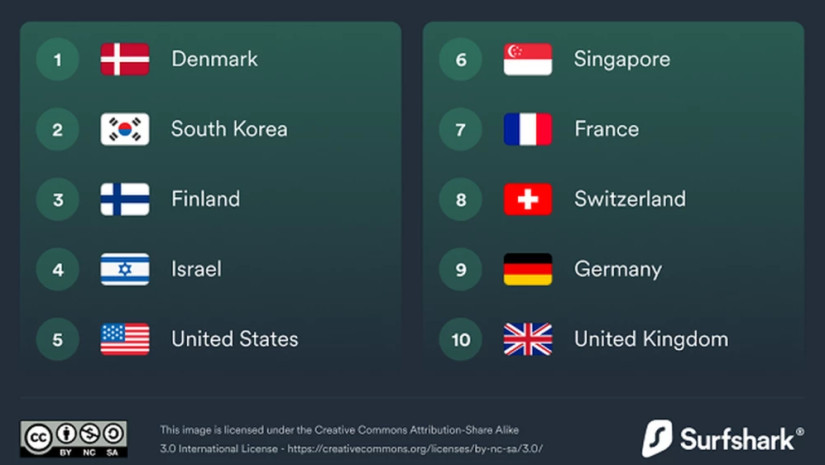The third annual edition of the Digital Quality of Life Index (DQL) ranks Georgia 63rd among 110 countries. Covering 90% of the global population, the DQL study is conducted by the cybersecurity company Surfshark and evaluates countries based on a set of five fundamental digital wellbeing pillars. Georgia ranks its highest in e-security (42nd) but shows comparatively lower results in internet affordability (60th), internet quality (75th), e-infrastructure (61st), and e-government (79th).
Overall, Georgia has demonstrated a notable drop compared to the DQL index 2020, falling from 63rd to 53rd place. Regionally, Georgia ranks 9th in Western Asia and surpasses Armenia, Jordan, and Azerbaijan.
Georgia has 2nd best e-security in Western Asia, ranking only behind Israel. It ranks 42nd globally and is 10% better than the global average. However, the study shows that Georgia's digital quality of life has room to improve, especially in internet quality and e-government. The country's broadband speeds rank on the lower end (26.43 Mbps), while the mobile broadband connection is slightly higher (33.03 Mbps), ranking 59th. The country's internet broadband connection growth year-over-year is one the lowest among all indexed countries, ranking only 106th out of 110 countries.
The researchers found that people in Georgia have to work almost 11 minutes for 1GB of cheapest mobile data.
“Digital opportunities have proved to be more important than ever during the COVID-19 crisis, stressing the importance for every country to ensure fully remote operational capacities for their economies,” – explains Vytautas Kaziukonis, CEO of Surfshark. “That is why, for the third year in a row, we continue the Digital Quality of Life research, which provides a robust global outlook into how countries excel digitally. The index sets the basis for meaningful discussions about how digital advancement impacts a country’s prosperity and where improvements can be made.”
In an all-around picture, 6 out of 10 countries holding the highest scores are located in Europe, following last year’s trend. Denmark ranks 1st in DQL for the second year in a row and is closely followed by South Korea. Finland ranks 3rd, while Israel and the U.S. round out the top five of 110 nations that were evaluated. The bottom 5 countries are Ethiopia, Cambodia, Cameroon, Guatemala, and Angola.
Regionally, the U.S. stands out as a country with the highest digital quality of life in the Americas, while South Korea takes the leading position in Asia. Among countries in Africa, people in South Africa enjoy the highest quality of their digital lives whereas Australia leads in Oceania, outperforming New Zealand in various digital areas.
The 2021 DQL research examined a total population of more than 6.9 billion people in terms of five core pillars and 14 underpinning indicators that provide a comprehensive measure. The study is based on open-source information provided by the United Nations, the World Bank, Freedom House, the International Communications Union, and other sources.












